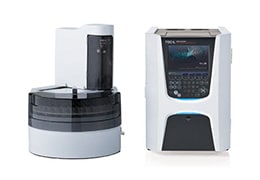
TOC-L Series
- The total organic carbon (TOC) content of biochar can be determined by the difference between total carbon (TC) and inorganic carbon (IC) content. - Both TC and IC can be measured easily and quickly, with each measurement taking approximately 10 minutes. - Up to 30 mg of carbon can be quantified for TC measurements and up to 20 mg for IC measurements.
Biochar is defined as a solid material produced by heating biomass to temperatures above 350 °C under controlled oxygen levels that prevent combustion. It is expected to have benefits such as soil improvement, increased agricultural productivity, and carbon sequestration in the soil. In recent years, carbon sequestration using biochar has attracted attention as one of the technologies enabling carbon dioxide removal (CDR) from the atmosphere, resulting in active research in this field. In 2019, the IPCC (Intergovernmental Panel on Climate Change) improved the guidelines to include a method for calculating carbon sequestration resulting from the application of biochar to agricultural and grassland soils. Consequently, carbon sequestration with biochar has been globally recognized as a CDR technology. Additionally, research and development of high-performance biochar that can achieve both high carbon sequestration efficiency and increased agricultural productivity is also underway to expand the use of biochar. Such research requires the evaluation of the total organic carbon (TOC) content in biochar and the TOC solid sample measurement system, which consists of the Shimadzu TOC-L total organic carbon analyzer combined with an SSM-5000A solid sample combustion unit, can be utilized for that purpose. This article presents an example of evaluating the TOC content of biochar using the Shimadzu TOC solid sample measurement system.
July 16, 2024 GMT
Some products may be updated to newer models